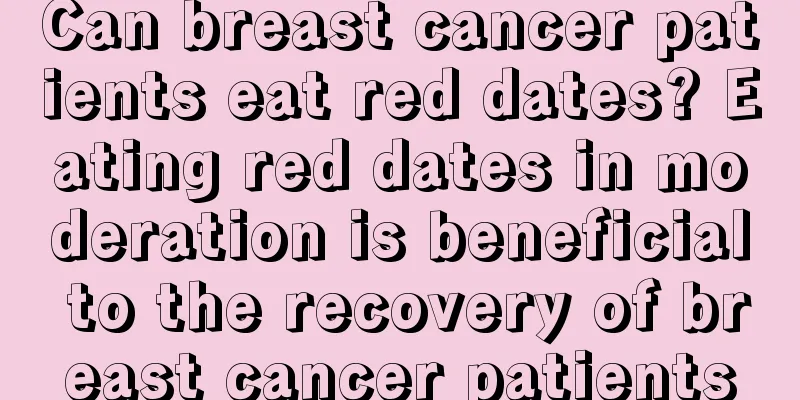Can breast cancer patients eat red dates? Eating red dates in moderation is beneficial to the recovery of breast cancer patients

|
Breast cancer patients can eat some red dates. Breast cancer is one of the most common malignant tumors in women. The patient's immunity may decline to varying degrees, especially for patients receiving chemotherapy, radiotherapy and other treatments. Therefore, patients with this disease need to ensure a balanced nutritional intake and eat more vegetables and fruits. Red dates are fruits with low sodium and fat content, high dietary fiber, vitamin E, iron and potassium content, and can also provide the body with the energy it needs. Breast cancer patients can eat red dates in moderation to improve their immunity and help them recover after surgery, radiotherapy and chemotherapy. It should be noted that food needs to be reasonably matched to be more beneficial to the patient's health. Overeating any one food is an unwise choice. Nutritional composition of red dates (content per 100g) Energy 264 (kcal) Medium sodium 6.2 (mg) Low fat 0.5 (g) Low insoluble dietary fiber 6.2 (g) High vitamin E 3.04 (mg) Medium iron 2.3 (mg) Medium potassium 524 (mg) Medium Suitable food Breast cancer patients should eat a low-fat diet, and are usually recommended to eat foods high in vitamin A, vitamin B, vitamin C, vitamin E, vitamin D, dietary fiber, selenium, and zinc. Vegetables, fruits, meat, eggs, and milk staple foods Fresh mushrooms, dried mushrooms, tomatoes, and carrots should be eaten with caution. Breast cancer patients should not eat spicy, fried, greasy, smoked, grilled, pickled, high-sugar foods, and moldy foods, and avoid smoking, alcohol, and coffee. Snacks Beverages Spicy foods Fried foods Pickled foods Milk candy, chocolate pie, strawberry sundae, crispy cones More suggestions In addition to strictly following dietary taboos, breast cancer patients should also pay attention to the following points: 1. Lose weight to bring the weight to the normal range (i.e., body mass index of 18.5~23.9kg/m2). 2. Try to get the necessary nutrients from the diet and use health products with caution. 3. Adult breast cancer patients aged 18 to 64 should exercise at least 150 minutes of moderate intensity or 75 minutes of high intensity aerobic exercise per week, and strength training (large muscle group resistance exercise) at least twice a week. If combined with chronic diseases that limit movement, the exercise time and intensity should be appropriately adjusted according to the doctor's guidance, but long periods of inactivity should be avoided. 4. Strictly follow the doctor's instructions for medication. During drug treatment, if there are adverse reactions such as nausea, vomiting, and skin rashes, seek medical attention immediately. |
<<: What are the symptoms of advanced liver cancer? 4 nursing methods for advanced liver cancer
Recommend
Can nasopharyngeal carcinoma cervical lymph node metastasis be cured?
Can nasopharyngeal carcinoma cervical lymph node ...
What causes dental neuralgia
Whether it is gingivitis or periodontitis, when w...
Dilong bee wine
Everyone may be familiar with bees. There are man...
I felt sick and wanted to vomit after drinking milk tea
In fact, milk tea is not a healthy drink. In orde...
The role of sun protection
In the summer, you must pay attention to sun prot...
Red spots on the soles of feet
Red spots on the soles of your feet may be due to...
What are the benefits of drinking chicken bone grass soaked in water?
In daily life, many people often neglect their ph...
What is the best way to treat liver cancer? Introduction to dietary principles for liver cancer patients
Clinically, the detection rate of early liver can...
Early symptoms of throat cancer
The early symptoms of laryngeal cancer mainly inc...
Middle age is the peak age for cervical cancer incidence. Early cervical cancer is easily missed.
Middle age is the peak age for cervical cancer in...
5 major symptoms indicate early lung cancer
The five major symptoms of early lung cancer incl...
What are the common clinical symptoms of kidney cancer?
The clinical manifestations of kidney cancer vary...
Are there any side effects from steroid injections?
Steroids are an injectable medication that can he...
Can colorectal cancer be transmitted between husband and wife?
Is colorectal cancer contagious between husband a...
Will a puncture biopsy cause lymph node metastasis?
Pathological diagnosis is achieved by completely ...









